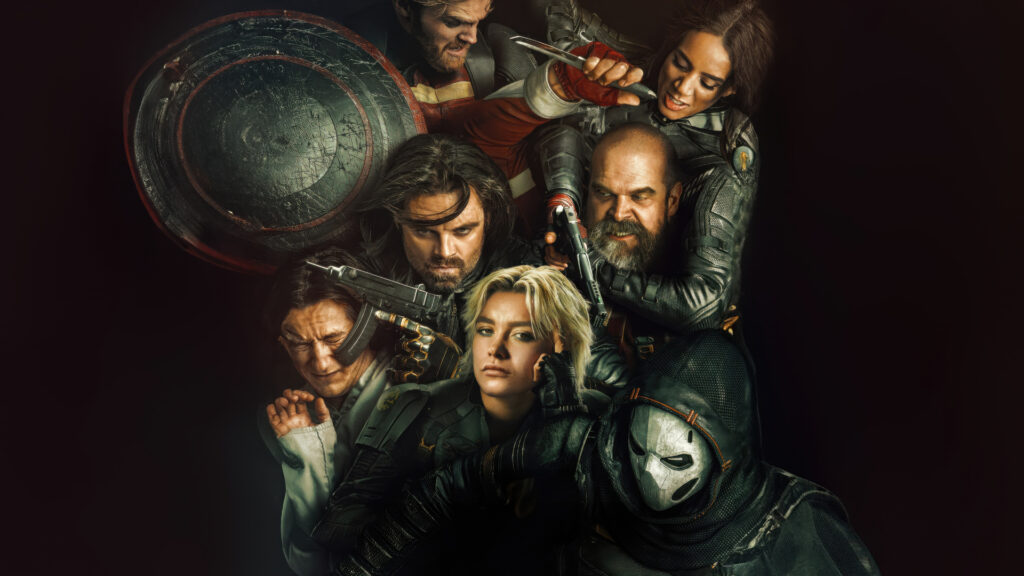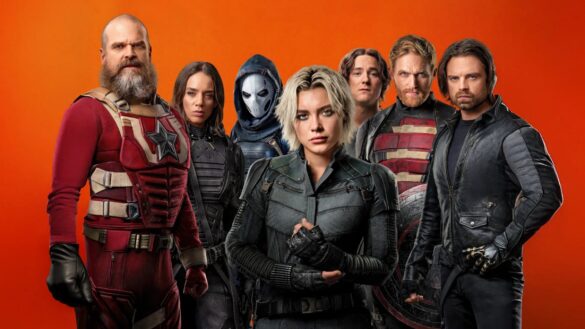Marvel Studios’ Thunderbolts (2025) is one of the most anticipated films of Phase Five of the Marvel Cinematic Universe (MCU). Directed by Jake Schreier and written by Eric Pearson and Joanna Calo, it departs from the traditional superhero formula, focusing instead on a team of antiheroes and reformed villains drawn from various corners of the MCU. Rather than centering on cosmic battles or world-ending stakes, Thunderbolts explores personal redemption, loyalty, and the murky line between good and evil.
Featuring a strong ensemble cast — Florence Pugh as Yelena Belova, Sebastian Stan as Bucky Barnes, David Harbour as Red Guardian, Wyatt Russell as U.S. Agent, Olga Kurylenko as Taskmaster, Hannah John-Kamen as Ghost, and Julia Louis-Dreyfus as Valentina Allegra de Fontaine — the film brings together characters defined by their moral ambiguity and past trauma. Together, they form a reluctant team of outcasts coerced into working for a cause that may or may not be just.

Plot Summary
Set in the aftermath of multiple global crises and the collapse of the Avengers’ unified structure, Thunderbolts follows Valentina Allegra de Fontaine, a shadowy government operative who recruits a team of misfits for a dangerous mission. Each member has a checkered past, ranging from assassins and spies to disgraced soldiers.
The group’s mission appears to be an official operation to protect national interests — but as the story unfolds, it becomes clear that Valentina’s motives are not entirely transparent. The team finds themselves trapped in a web of deception, tasked with infiltrating a secret facility that may hold political prisoners, experimental weapons, or even something darker.
Tensions quickly rise within the group. Yelena Belova, driven by her sister Natasha Romanoff’s legacy, struggles to reconcile her moral compass with the actions she’s forced to take. Bucky Barnes, still haunted by his years as the Winter Soldier, seeks redemption but questions whether violence can ever truly make up for his past. The Red Guardian, a relic of Soviet heroism, tries to prove his worth to a younger generation. U.S. Agent, ever the patriot, represents blind loyalty to authority. Ghost, who once fought only for survival, yearns for peace but remains distrustful of others. And Taskmaster, who was once controlled and manipulated, now seeks autonomy but is unsure what that truly means.
The mission soon spirals into chaos as betrayal, distrust, and hidden agendas surface. When they uncover the true nature of Valentina’s plan — that they are being used as disposable assets in a political cover-up — the team must decide whether to follow orders or fight back. In the process, they are forced to confront their own moral failings and question what it really means to be a hero.
Main Characters
Yelena Belova (Florence Pugh)
As the emotional core of the team, Yelena is both a skilled assassin and a woman scarred by loss. Her relationship with her late sister, Natasha Romanoff, continues to shape her motivations. She is quick-witted, cynical, and compassionate beneath her hardened exterior. Throughout the film, Yelena struggles with guilt — for her past as a Black Widow and for her inability to live up to the idealized image of her sister. Her arc is one of rediscovery: finding her own moral code in a world that no longer believes in heroes.
Bucky Barnes (Sebastian Stan)
The former Winter Soldier represents the film’s conscience. Once a brainwashed killer, Bucky continues to seek redemption, yet he doubts whether forgiveness is even possible. His experiences have left him deeply skeptical of authority, and his relationship with Yelena becomes one of mutual understanding. Both characters share a deep sense of loss and moral fatigue. For Bucky, joining the Thunderbolts is less about loyalty and more about atonement — though the line between justice and vengeance remains blurred.
Red Guardian (David Harbour)
Alexei Shostakov, the Red Guardian, brings both humor and pathos. Once celebrated as the Soviet Union’s answer to Captain America, he is now a man out of time — aging, disillusioned, and craving relevance. His bluster hides a fragile ego and a desperate need to be seen as a hero. He serves as both comic relief and tragic figure, embodying the dangers of nostalgia and nationalistic pride.
U.S. Agent (Wyatt Russell)
John Walker, the U.S. Agent, represents the darker side of patriotism. Stripped of his Captain America title, he remains fiercely devoted to his country — even when his orders conflict with his conscience. His journey in Thunderbolts explores what happens when loyalty becomes blind obedience. Walker’s presence on the team often sparks conflict, especially with Bucky, whose distrust of government control runs deep.
Taskmaster (Olga Kurylenko)
Taskmaster, or Antonia Dreykov, remains a mysterious and stoic figure. Her ability to mimic fighting styles makes her both an asset and a threat. No longer under the mind control that once dictated her every move, she now struggles to define who she is. Her silence throughout much of the film speaks volumes about trauma and the difficulty of reclaiming identity after manipulation.
Ghost (Hannah John-Kamen)
Ghost, or Ava Starr, adds another layer of tragedy. Her powers — the ability to phase through matter — come at a personal cost, making her existence painful and unstable. Having lived a life of isolation, she’s wary of others but ultimately desires belonging. Her arc mirrors the broader theme of the film: the longing to find a place in a world that fears what it cannot understand.
Valentina Allegra de Fontaine (Julia Louis-Dreyfus)
Valentina is the mastermind behind the Thunderbolts program. Charming, calculating, and manipulative, she operates in the shadows, assembling a team not out of idealism but out of pragmatism. Her true motives remain ambiguous — whether she’s working for a noble cause, a political agenda, or her own gain. She serves as the embodiment of moral ambiguity within the MCU: a reminder that those who claim to protect the world often have the most to hide.
Themes
Redemption and Forgiveness
At its heart, Thunderbolts is about second chances. Each member of the team has blood on their hands, and the film asks whether redemption is ever truly possible. Can a person who has done terrible things ever make peace with themselves? The film suggests that redemption is not a single act but a continuous process — one that requires self-awareness, courage, and sacrifice.
Power and Corruption
Unlike traditional superhero teams that fight for justice, the Thunderbolts operate under government oversight. Their missions are politically motivated, blurring the line between service and exploitation. The film critiques the institutional manipulation of individuals who have been broken or discarded, showing how power often feeds on the vulnerable.
Moral Ambiguity
In Thunderbolts, there are no clear heroes or villains — only people with competing motivations. The film rejects black-and-white morality, choosing instead to dwell in shades of gray. This complexity makes it one of the more mature entries in the MCU, exploring how trauma and survival shape ethical choices.
Identity and Legacy
For many of the Thunderbolts, identity is a battleground. They are defined by past mistakes, and the film explores whether one’s legacy can be rewritten. Bucky Barnes wants to atone for his crimes as the Winter Soldier; Yelena wants to step out of Natasha’s shadow; Taskmaster wants to reclaim her sense of self. Together, they represent different facets of identity reconstruction.
Trust and Teamwork
Unlike the Avengers, the Thunderbolts are not bound by friendship or shared ideals. They are forced together by circumstance. Trust is fragile, constantly tested by betrayal and self-interest. Their journey from mutual suspicion to reluctant unity forms the emotional backbone of the story.
Cinematography and Tone
Thunderbolts maintains a darker, more grounded aesthetic compared to other recent Marvel films. The visual style reflects the characters’ fractured psyches — muted colors, harsh lighting, and a sense of claustrophobia within enclosed spaces. The action sequences are intense but never gratuitous, focusing on the emotional cost of violence rather than spectacle.
The tone strikes a balance between humor and tragedy. David Harbour’s Red Guardian injects levity, while Pugh and Stan anchor the film with emotional weight. The dialogue is sharp, laced with cynicism and world-weariness, reflecting the disillusionment of characters who have seen too much to believe in simple heroism.
Place in the MCU
As the concluding film of Phase Five, Thunderbolts serves as both a continuation and a transition. It connects storylines from Black Widow, The Falcon and the Winter Soldier, and Ant-Man and the Wasp, while setting the stage for future conflicts involving morally complex figures. It also explores the vacuum left by the Avengers, questioning who gets to define heroism in their absence.
The formation of the Thunderbolts represents a shift in the MCU’s tone — from idealism toward introspection. Rather than perfect heroes, audiences are given damaged individuals trying to find meaning in chaos. This shift aligns with broader cultural trends that favor antiheroes and psychological depth over simple heroics.
Reception and Impact
Upon release, Thunderbolts was praised for its strong performances, character-driven storytelling, and willingness to explore moral complexity. Florence Pugh received particular acclaim for her nuanced portrayal of Yelena Belova, while Sebastian Stan’s quiet intensity provided emotional grounding. Critics highlighted the ensemble’s chemistry and the film’s restrained approach to action.
While not the most visually spectacular Marvel entry, Thunderbolts was seen as a refreshing departure from the formulaic superhero blockbuster. Its success demonstrated that audiences were ready for more character-based narratives within the MCU.
Conclusion
Thunderbolts (2025) stands out as one of the MCU’s most mature and introspective films. It abandons the traditional hero’s journey for something more complicated — a story about flawed individuals searching for redemption in a world that no longer believes in heroes.
Through its focus on moral ambiguity, personal responsibility, and emotional depth, Thunderbolts redefines what it means to be part of a team. These characters are not paragons of virtue but mirrors of humanity’s contradictions — capable of cruelty, compassion, and change.
In the end, the film’s message is clear: redemption is not about erasing the past but about facing it, learning from it, and finding strength in imperfection. Thunderbolts is both a thrilling action film and a poignant exploration of guilt, loyalty, and the fragile hope that even the broken can still make a difference.

